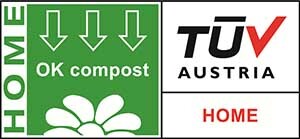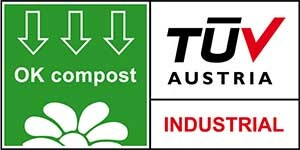In this article, we'll cover:
- What is TÜV Austria?
- What are the Types of Certifications?
- Why are Certifications by TÜV Austria Important?
- Who Can Benefit from OK compost HOME & OK compost INDUSTRIAL?
- How Can Businesses Obtain Certifications from TÜV Austria?
- Real-World Examples of Certifications by TÜV Austria
What is TÜV Austria?
TÜV Austria, a leading international certification body, performs compostability certifications. It is given only to products that meet strict compostability requirements set by the European standard EN 13432. This standard specifies the criteria for packaging recoverable through composting. TÜV Austria's certification are a globally trusted symbol for compostable products. It ensures that the product has been tested to break down completely in a specific composting environment, leaving no harmful residues behind.
What are the Types of Certifications?
Their program offers various certifications based on the different aspects of compostability. Each type of certification focuses on a specific composting environment and must meet certain sets of standards.
Some of the types of their certifications include:
- OK compost HOME: This certification is specifically for products that are designed to be composted in home composting systems. It verifies that the product will break down in a home compost environment like a garden compost heap without leaving behind harmful residues.

- OK compost INDUSTRIAL: This certification is for products that are intended for composting in an industrial composting environment. They ensure that products are truly compostable, meeting strict guidelines for compostability set by the European standard EN 13432.

What Does the Certification Process Involve?
To obtain a certification, a product must go through a rigorous testing process and meet many technical requirements.
- Chemical analysis: The product is tested to ensure that it does not contain any harmful substances that could contaminate the compost.
- Biodegradability testing: The product is placed in an industrial composting facility and monitored to ensure that it breaks down completely within a specific timeframe.
- Disintegration testing: The product is tested to ensure that it breaks down into small pieces that will not interfere with the composting process.
- Ecotoxicity testing: The product is tested to ensure that it does not release any harmful substances into the environment during the composting process.
Once a product has passed all of these tests, it is awarded the OK compost TÜV certification.
Why are Certifications by TÜV Austria Important?
Ensures Environmental Responsibility
TUV Austria verifies that a product is truly compostable and will not harm the environment. With this certification, businesses and consumers can trust that the product has been thoroughly tested and meets the strict requirements for compostability.
Meets Organic Composting Standards
Organic composting is the process of breaking down organic materials into a nutrient-rich soil amendment. This process is essential for sustainable agriculture and reducing waste. The certification ensures that a product meets the standards for organic composting, making it a valuable certification for businesses and consumers alike.
Demonstrates Commitment to Sustainability
Obtaining a certification of compostability demonstrates a business's commitment to sustainability and environmental responsibility. By using certified compostable products, businesses can reduce their carbon footprint and contribute to a more sustainable future.
Who Can Benefit from OK compost HOME & OK compost INDUSTRIAL?
Businesses
Businesses that produce compostable products can benefit greatly from obtaining a certification. It can help them stand out in the market and attract environmentally-conscious consumers. It also ensures that their products meet the strict standards for compostability, reducing the risk of any negative impact on the environment.
Composters
Composters also benefit as they have a Home Compostable certification that gives guidance on what products will break down quickly and work for certain composter business models.
Consumers
This certification also helps consumers make more informed purchasing decisions, allowing them to support businesses that prioritize sustainability. When you pick products with this certification, you can be sure they are compostable and won't hurt the environment.
The Environment
Ultimately, the TÜV Austria compostability certifications benefit the environment by ensuring that products are truly compostable. They can reduce the amount of waste that ends up in landfills by allowing for end-of-life composting.
How Can Businesses Obtain Certifications like OK Compost HOME or OK Compost INDUSTRIAL?
To obtain a certification, businesses must follow these steps:
- Apply for certification: Businesses must contact TÜV Austria, to begin the certification process.
- Submit product samples: The certification body will request product samples for testing.
- Wait for results: The product will go through the rigorous testing process outlined earlier in this article.
- Receive certification: If the product passes all tests, it will be awarded the appropriate certification(s).
Real-World Examples of Certifications by TÜV Austria
BioBag
BioBag is a company that produces compostable bags and films made from plant-based materials. They have obtained the OK compost HOME for many of their products, ensuring that they are truly compostable.
World Centric
World Centric unlined fiber products are both OK compost HOME and OK compost INDUSTRIAL. Their PLA-lined fiber containers are OK compost INDUSTRIAL.
Conclusion
Certifications by TÜV Austria are valuable for businesses and consumers alike. They ensure that products are truly compostable, meeting strict guidelines for compostability set by the European standard EN 13432. By obtaining this certification, businesses can demonstrate their commitment to sustainability and attract environmentally-conscious consumers.
Consumers can trust that products with this certification are truly compostable and will not harm the environment. Ultimately, these certifications benefit the environment by reducing waste and promoting sustainable agriculture through organic composting.
Looking for compostable packaging? Check out all of our compostable packaging certification options!



